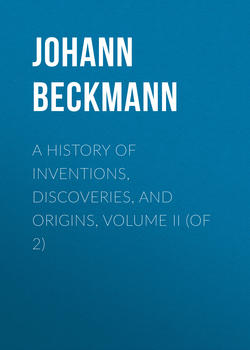A History of Inventions, Discoveries, and Origins, Volume II (of 2)

Реклама. ООО «ЛитРес», ИНН: 7719571260.
Оглавление
Johann Beckmann. A History of Inventions, Discoveries, and Origins, Volume II (of 2)
THE STEAM-ENGINE, AND THE DISCOVERIES OF JAMES WATT
LENDING AND PAWNBROKING
CHEMICAL NAMES OF METALS
ZINC
CARP
CAMP-MILLS
MIRRORS135
GLASS-CUTTING. ETCHING ON GLASS
SOAP
MADDER
JUGGLERS, ROPE-DANCERS, AUTOMATA, ETC
ARTIFICIAL ICE. COOLING LIQUORS
HYDROMETER
LIGHTING OF STREETS
NIGHT-WATCH
PLANT-SKELETONS
BILLS OF EXCHANGE
TIN. TINNING
SOWING-MACHINES
MANGANESE561
PRINCE RUPERT’S DROPS. LACRYMÆ VITREÆ
FIRE-ENGINES
INDIGO
VANES. WEATHERCOCKS
GILDING
FUR DRESSES
STEEL
STAMPING-WORKS831
KITCHEN VEGETABLES
KNITTING NETS AND STOCKINGS. STOCKING-LOOM
HOPS
BLACK LEAD
SAL-AMMONIAC
FORKS
LOTTERY. TONTINE
BOLOGNA STONE
FOUNDLING HOSPITALS
ORPHAN HOUSES
INFIRMARIES. HOSPITALS FOR INVALIDS. FIELD LAZARETTOS
COCK-FIGHTING
SALTPETRE. GUNPOWDER. AQUAFORTIS
BOOK-CENSORS
EXCLUSIVE PRIVILEGE FOR PRINTING BOOKS
CATALOGUES OF BOOKS
RIBBON-LOOM
GUNS. GUN-LOCKS
Отрывок из книги
It appears singular to us at present that it should have been once considered unlawful to receive interest for lent money; but this circumstance will excite no wonder when the reason of it is fully explained. The different occupations by which one can maintain a family without robbery and without war, were at early periods neither so numerous nor so productive as in modern times; those who borrowed money required it only for immediate use, to relieve their necessities or to procure the conveniences of life; and those who advanced it to such indigent persons did so either through benevolence or friendship. The case now is widely different. With the assistance of borrowed money people enter into business, and carry on trades, from which by their abilities, diligence, or good fortune, so much profit arises that they soon acquire more than is requisite for their daily support; and under these circumstances the lender may undoubtedly receive for the beneficial use of his money a certain remuneration, especially as he himself might have employed it to advantage; and as by lending it he runs the risk of losing either the whole or a part of his capital, or at least of not receiving it again so soon as he may have occasion for it.
Lending on interest, therefore, must have become more usual in proportion as trade, manufactures, and the arts were extended; or as the art of acquiring money by money became more common: but it long continued to be detested, because the ancient abhorrence against it was by an improper construction of the Mosaic law converted into a religious prejudice2, which, like many other prejudices more pernicious, was strengthened and confirmed by severe papal laws. The people, however, who often devise means to render the faults of their legislators less hurtful, concealed this practice by various inventions, so that neither the borrower nor lender could be punished, nor the giving and receiving of interest be prevented. As it was of more benefit than prejudice to trade, the impolicy of the prohibition became always more apparent; it was known that the new-invented usurious arts under which it was privately followed would occasion greater evils than those which had been apprehended from lending on interest publicly; it was perceived also that the Jews, who were not affected by papal maledictions, foreigners, and a few natives who had neither religion nor conscience, and whom the church wished least of all to favour, were those principally enriched by it.
.....
Of the lending-houses established after this period in Italy, I shall mention those only of Rome and Naples. It is very remarkable that the pope’s capital should have been without an institution of this kind till the year 1539, and that it should have been formed by the exertions of Giovanni Calvo, a Franciscan. Paul III., in his bull of confirmation, ordered that Calvo’s successors in rank and employment should always have the inspection of it, because the Franciscans had taken the greatest pains to endeavour to root out usury38.
The lending-house at Naples was first established in 1539 or 1540. Two rich citizens, Aurelio Paparo, and Leonardo or Nardo di Palma, redeemed all the pledges which were at that time in the hands of the Jews, and offered to deliver them to the owners without interest, provided they would return the money which had been advanced on them. More opulent persons soon followed their example; many bequeathed large sums for this benevolent purpose; and Toledo, the viceroy, who drove the Jews from the kingdom, supported it by every method possible. This lending-house, which has indeed undergone many variations, is the largest in Europe; and it contains such an immense number of different articles, many of them exceedingly valuable, that it may be considered as a repository of the most important part of the moveables of the whole nation. About the year 1563, another establishment of the like kind was formed under the title of banco de’ poveri. At first this bank advanced money without interest, only to relieve confined debtors; afterwards, as its capital increased, it lent upon pledges, but not above the sum of five ducats without interest. For larger sums the usual interest was demanded39.
.....